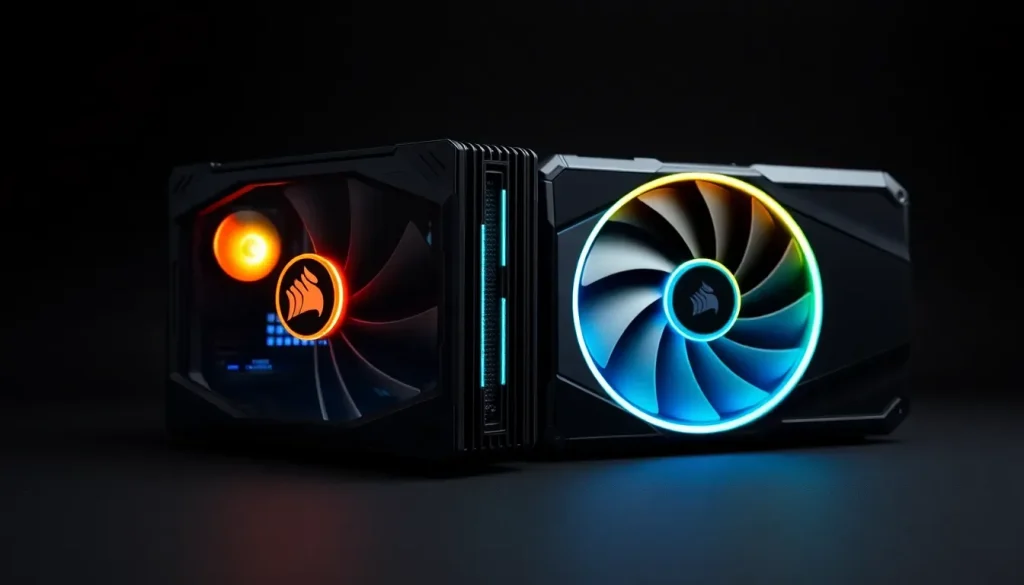Corsair MP700 Elite versus Samsung 9100 Pro comparison

Affiliate Disclosure: This post may include affiliate links. If you click and make a purchase, I may earn a small commission at no extra cost to you.
As the demand for high-performance storage solutions continues to grow, the competition in the Gen 5.0 NVMe SSD market has intensified. Among the key players, the Corsair MP700 Elite and Samsung 9100 Pro stand out, each offering unique features and specifications. In this comparison, we’ll delve into the technical aspects, benchmark performances, and overall value of these two SSDs to help you make an informed decision.
- Overview of the Corsair MP700 Elite and Samsung 9100 Pro
- Comparing Theoretical Specifications
- Benchmark Scores: Real-World Performance Comparison
- Price-to-Performance Ratio
- Endurance Specifications: TBW, DWPD, MTBF, and Warranty
- Technical Specifications: What’s Under the Hood?
- Power Consumption and Efficiency
- Video Review and Analysis
- Choosing the Right SSD: Factors to Consider
Overview of the Corsair MP700 Elite and Samsung 9100 Pro
The Corsair MP700 Elite is a DRAM-less SSD designed for cost efficiency while still providing solid performance. In contrast, the Samsung 9100 Pro incorporates a dedicated DRAM cache, enhancing its capabilities for sustained and random workloads. This fundamental difference in architecture plays a crucial role in their performance metrics.
Samsung's 9100 Pro is known for its advanced Presto controller and robust DRAM cache, which significantly improves its speed and reliability. Meanwhile, the MP700 Elite employs the Phison E31T controller, focusing on balancing cost and performance, but it falls short in comparison to the Samsung model.
Comparing Theoretical Specifications
When examining the theoretical specifications, the Samsung 9100 Pro dominates across the board. Both drives utilize PCIe 5.0 x4 and NVMe 2.0 technology, yet the 9100 Pro outperforms the MP700 Elite significantly in various metrics:
- Read/Write Speeds: The 9100 Pro achieves speeds of approximately 14–15 GB/s compared to the MP700 Elite’s 10 GB/s.
- Random IOPS: Samsung’s design results in much higher Input/Output Operations Per Second (IOPS), crucial for performance in multi-tasking environments.
- Capacity Options: The 9100 Pro offers a 4TB variant, giving users more flexibility in storage capacity.
With these superior specifications, the MP700 Elite appears to be an entry-level drive in the Gen 5 category.
Benchmark Scores: Real-World Performance Comparison
Benchmark scores are pivotal in assessing the real-world performance of SSDs. Here, we will analyze various benchmark tests for the 2TB variants of both drives.
PCMark 10 Full System Drive Benchmark
The PCMark 10 benchmark simulates a variety of everyday tasks, such as loading applications and editing files. In this test, the Samsung 9100 Pro scored 6,597 points, while the MP700 Elite lagged behind at 5,008 points, demonstrating the former's superior performance in real-world scenarios.
3DMark Storage Test for Gamers
This benchmark focuses on gaming-related tasks, including game installation and level loading. The 9100 Pro again outperformed the MP700 Elite, achieving a score of 6,371 compared to 5,194. The consistent lower latency of the Samsung SSD enhances its appeal for gamers.
CrystalDiskMark Sequential Read/Write Performance
In synthetic benchmarks, the 9100 Pro outshone the MP700 Elite across all read and write tests:
- 1MB QD8 Read Speeds: Approximately 37% higher than the MP700 Elite.
- Write Speeds: Nearly 50% faster in varying conditions.
This performance makes the Samsung drive ideal for users handling large files or demanding workloads.
CrystalDiskMark Random Read/Write Performance
For the 4KB test, the Samsung 9100 Pro maintained its lead, especially under high queue depths. However, the Corsair MP700 Elite showed competitive performance in low queue depths, making it a viable option for less demanding tasks.
Price-to-Performance Ratio
Despite the close pricing of both drives, the Samsung 9100 Pro offers a better price-to-performance ratio. While the MP700 Elite may appear slightly cheaper in some markets, the overall value of the 9100 Pro, given its superior specs, is more compelling:
- Enhanced performance per gigabyte.
- More consistent and reliable benchmark results.
- Longer lifespan and efficiency in high-demand scenarios.
Endurance Specifications: TBW, DWPD, MTBF, and Warranty
Both SSDs exhibit comparable endurance specs, generally meeting industry standards. Users can expect:
- 600 TBW for 1TB models.
- Consistent DWPD ratings for longevity.
- Similar MTBF figures, ensuring reliability over time.
Technical Specifications: What’s Under the Hood?
In terms of technical details, the 9100 Pro integrates a stronger controller (Presto S4LY027) and LPDDR4X DRAM, providing better performance management. The comparison of NAND technology also favors Samsung:
- NAND Layers: 236-layer V8 TLC versus 218-layer BiCS8 in Corsair.
- Cache Management: Samsung’s Turbo-Write enhances performance, even with lower clock speeds.
Power Consumption and Efficiency
When it comes to power efficiency, the Corsair MP700 Elite performs slightly better, demonstrating effective power management while consuming less energy during standard operations. However, the Samsung 9100 Pro, while faster, draws more power, particularly under heavy loads:
- Corsair: 682 MB/s per watt efficiency.
- Samsung: 503 MB/s per watt efficiency.
This makes the MP700 Elite a stronger candidate for energy-conscious setups.
Video Review and Analysis
For a more visual analysis of the performance differences between these two SSDs, check out this review video:
Choosing the Right SSD: Factors to Consider
When deciding between the Corsair MP700 Elite and Samsung 9100 Pro, consider the following factors:
- Performance Needs: For high-end gaming or professional work, the 9100 Pro is an obvious choice.
- Budget Constraints: If you're looking for a cost-effective solution for everyday use, the MP700 Elite may suffice.
- Power Efficiency: The MP700 Elite is better for low-power setups, making it suitable for laptops.
Ultimately, the Samsung 9100 Pro stands out as a superior choice for users who prioritize performance and reliability, while the Corsair MP700 Elite can serve as a cost-effective solution for more casual users.




Leave a Reply